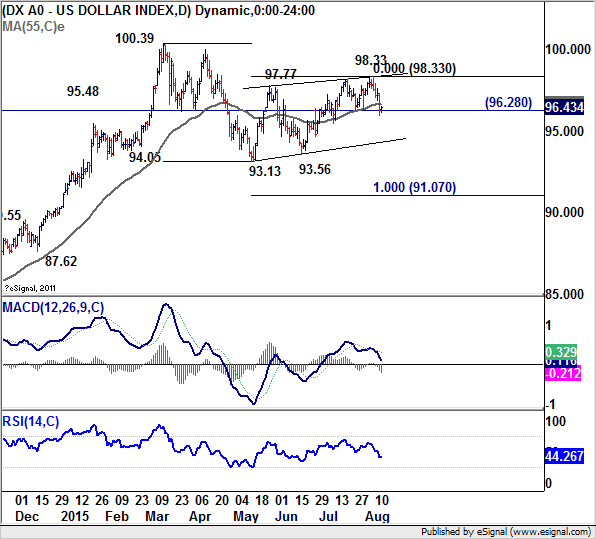Dollar stays generally weak this week, except against Aussie and Yen, even though sentiments seemed to have stabilized. DJIA recovered from sharp early loss and closed nearly flat down -0.33 pts. There were continuous talk that China's devaluation of yuan would delay Fed's rate hike. Markets pushed down the chance of a September hike through 40% to as low as 39%. That compared to over 50% last week. Meanwhile, the chance for a December hike stood above 65%. China's move was seen as deflationary to US and could trigger much uncertainty in the global financial markets. Meanwhile, some economists noted that the risks for Fed to hike too early or too late are heavily skewed.
Dollar index's break of 96.28 support now suggests that rise from 93.56 has completed at 98.33. Also, price actions from 93.13 is seen as a three wave consolidation pattern and is possibly completed too. That indicates that the corrective pattern from 100.39 is starting the third leg through 93.13 low. This will now be the preferred case as long as 98.33 resistance holds.

PBoC, China's central bank, set the yuan exchange rate further lower today at 6.401 prior to market open today. But that was not as weak as some feared. Also, PBoC tried to calm the markets by saying that there is no basis for further depreciation. Meanwhile, it will monitor "abnormal" cross board flows. Earlier this week, China devaluated yuan by -1.9% on Tuesday, the sharpest adjustment on record. That was followed by -1.6% devaluation on Wednesday. There were talks that China is aiming to devaluate the currency by at least -10%.
In Australia, RBA deputy governor Philip Lowe warned that "movements in exchange rates often set off a chain reaction of events which can be difficult to predict." And RBA will watch the developments carefully, "particularly in Asia, because many currencies have adjusted in the last couple of days." Lowe also pointed out that "growth momentum in China is a bit weaker than the authorities had expected, and the exchange rate adjustment is part of the correction for that". Though, he also pointed out two other interpretations for the devaluation, being for unwinding some of the large surge in yuan over the past year, and taking steps towards a more market-based exchange rate.
In Japan, BoJ board member Sayuri Shirai said she's expecting inflation to reach 2% target by the end of March 2017. That's different from BoJ governor Haruhiko Kuroda's expectation that it will reach 2% target around September next year. Shirai said she took a "slightly more cautious view". And she noted falls in oil prices as a cause while inflation has moved sideway since fiscal 2013.
On the data front, New Zealand manufacturing index dropped to 53.5 in July. Australia consumer inflation expectation rose 3.7% in August. Japan machine orders dropped -7.9% mom in June. UK RICS house price balance rose to 44 in July. German CPI final and Swiss PPI will be the main focus in European session. US will release retail sales, import price, jobless claims and business inventories.
